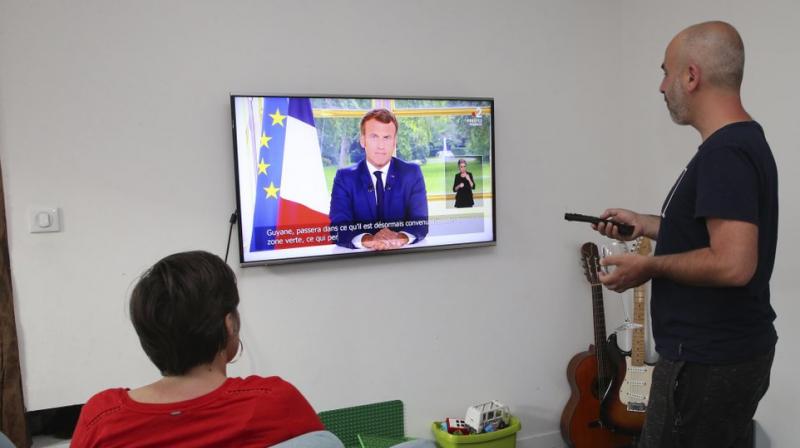Macron rejects racism but says colonial statues to remain in France
16 June, 2020

French President Emmanuel Macron has vowed Sunday to stand strong against racism but also praised police and insisted that France wouldn’t remove statues of controversial, colonial-era figures, as he addressed the issues for the very first time since George Floyd’s loss of life on the U.S.
In a televised address to the country on Sunday evening, Macron needed the nation’s “unity” at an integral moment when the united states is trying to place the coronavirus crisis behind while being shaken by some protests against racial injustice and law enforcement brutality.
Echoing American protesters, demonstrators in France possess expressed anger by discrimination within French society, particularly toward minorities by the country’s ex - colonies in Africa.
Unusually for a French leader, Macron acknowledged that someone’s “address, name, color of skin” can reduce their chances at succeeding in French society, and called for a fight to make certain that everyone can “find their place” irrespective of ethnic origin or religion. He promised to come to be “uncompromising when confronted with racism, anti-Semitism and discrimination.”
Even so, he insisted that France will not remove statues of controversial, colonial-era figures just as has happened in some different countries in recent weeks.
Amid demands taking down statues tied to France’s slave trade or perhaps colonial wrongs, Macron said “the republic won't erase any trace, or any name, from its history ... it will not remove any statue.”
“We have to look at our history as well as lucidity” including relations with Africa, with an objective of “truth” rather than “denying who we happen to be,” Macron said.
He didn’t address accusations of police violence but said forces of buy deserve “the nation’s reputation.”
Meanwhile, his authorities is facing developing pressure to confront racism and police violence.
At least 15,000 persons demonstrated in Paris on Saturday, the most recent in a string of French protests galvanized by the May 25 loss of life of Floyd - a black gentleman who died after a white Minneapolis officer pressed a knee to his neck - and the Dark Lives Matter movement, but increasingly centered on France’s own tensions between law enforcement and minorities.
In response, the government banned police chokeholds and vowed to stamp away racism among police - but which has now angered police unions, who say they’re being unfairly painted as white colored supremacists and staged protests of their very own.
Government minister Sibeth Ndiaye - a close Macron ally and the most prominent dark figure in current French politics - wrote a great unusually personal essay Saturday in Le Monde calling for France to rethink its colorblind doctrine, which is aimed at encouraging equality by ignoring competition altogether.
“We should not hesitate to mention things, to say a skin color isn't neutral,” she wrote. She named on the French to “confront our memories” about their history and locate a “shared narrative” with ex - colonies.
Macron’s speech also sought to “turn the site” of the virus crisis, as France will reopen practically everything starting Monday.
Restrictions had started getting gradually eased on, may 11 after 8 weeks of stricter lockdown.
“We will get back our life-style, our taste for independence,” Macron said. “Basically, we will rediscover France fully once again.”
Restaurants in the Paris region can be permitted to open indoor areas starting on Monday - rather than outdoor seating only.
Macron vowed to create from saving as many jobs due to possible his top priority.
A forecast the other day from the business for Economic Cooperation and Development showed France’s economy are affected more than most from the coming recession.
The economy is likely to shrink at least 11% percent this season, pushing many out of work and torpedoing Macron’s goals of decreasing unemployment, rehauling the retirement system and making France more globally competitive.
France is reopening it has the borders with other European countries at midnight and can start allowing tourists from other continents on July 1.
Despite having one of the world’s best healthcare systems, France was dangerously brief of all types of masks and assessment capacity as coronavirus sufferers overwhelmed intensive health care wards in March. More than 80 lawsuits have been filed accusing his federal government of manslaughter, neglect or otherwise mishandling the virus crisis.
Macron submitted the army to help and ordered strict lockdown steps that slowed the pass on. But nearly 30,000 persons have died, about half of these amid residents of assisted living facilities, and a lot more than 150,000 have already been infected. A lot more than 200 latest virus clusters possess emerged since France started reopening May 11, based on the national health agency.
“Dozens of a large number of lives have already been saved by our alternatives, our works,” Macron stressed.
Source:
